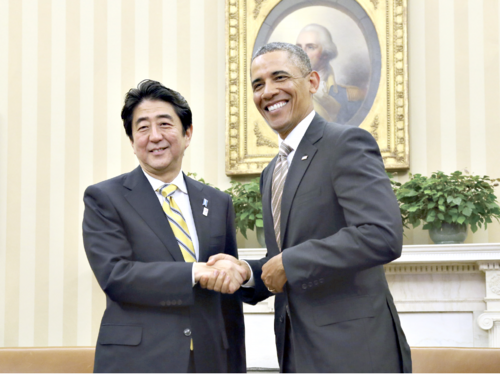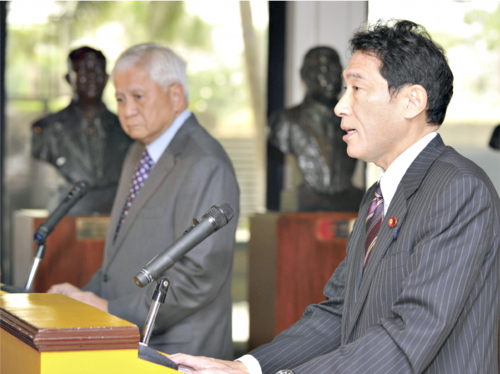2. Japan’s Diplomacy
In order to protect and enhance national interests, Japan’s foreign diplomacy prioritizes three policies: Strengthening the Japan-U.S. Alliance, deepening cooperative relationships with neighboring nations, and strengthening economic diplomacy as a means to promoting the revitalization of the economy.
(1)Strengthening of the Japan-U.S. Alliance
In order to ensure the security of Japan in this increasingly challenging security environment the Japan-U.S. Alliance, the linchpin of Japan’s diplomacy, would be further strengthened. Since the conclusion of the current Japan-U.S. Security Treaty in 1960, Japan and the U.S. have developed an unwavering allied relationship based on democracy, respect for human rights, the “rule of law” and common interests. Today as the strategic environment of the Asia-Pacific region is undergoing significant change, the importance of the Japan-U.S. alliance continues to grow, not only for Japan but also for the peace and stability of the region. Prime Minister Abe visited the U.S. in February, 2013 to meet with President Obama. The meeting highlighted the strong ties of the Japan-U.S. Alliance both to the Japanese nationals and to the world.
The Obama Administration’s diplomatic policy, which places emphasis on the Asia-Pacific region, is a welcome development for Japan. Japan will pursue greater cooperation with the U.S. in a broad range of areas in order to increase the deterrence capacity of the Japan-U.S. security partnership, while enhancing its own defense capacity. Japan will implement its part of the realignment of U.S. forces in compliance with the current Japan-U.S. agreement and address the issue of reducing the burden placed on Okinawa, while maintaining the deterrence capacity.
Beyond security, Japan will take a multifaceted approach to strengthening its relationship with the U.S., particularly in terms of the economy and people-to-people exchanges.

Prime Minister Abe, left, meeting with the U.S. President Obama (February 22, 2013 in Washington, Photo: Cabinet Public Relations Office)
(2)Emphasis on Cooperative Relations with Neighboring Countries
The maintenance of peace and stability in the region is vital to the protection of national interests. In addition to strengthening of the Japan-U.S. Alliance, Japan is determined to contribute to the peace and stability in the region as a responsible country.
During 2012, many of the major counties of the Asia-Pacific region--China, the ROK and Russia-- experienced leadership changes. Enhancing cooperative relations and developing and strengthening relationships of trust with neighboring countries will lay the foundations for the mid to long-term peace and stability of the whole region, not merely Japan. Led by this understanding, Japan is working to enrich relationships with its neighboring countries. Furthermore, Japan will enhance its cooperative relationships from broad and strategic perspectives with India, Australia and other countries with which Japan shares fundamental values and responsibility for the stability and prosperity of the region.
In this context, ASEAN is becoming more and more important for Japan. For their first overseas visits in their new capacities, Prime Minister Abe and Minister for Foreign Affairs Kishida chose to visit ASEAN countries in January 2013. During his visit to Indonesia, Prime Minister Abe announced the five principles of Japan’s ASEAN Diplomacy. 2013 marks the 40th Year of ASEAN-Japan Friendship and Cooperation, and Japan will strive to further strengthen the relationship with ASEAN. Japan will also continue to support Myanmar’s efforts to achieve democratic governance.

Foreign Minister Kishida, right, and Secretary of Foreign Affairs of the Philippines Del
Rosario at the joint press conference (January 10, 2013 in Manila, Philippines)
Japan is a maritime country and relies almost entirely on marine transportation for the import of energy resources. As such, the development of stable maritime order based on international law is an important issue that has a direct impact on the country’s national interests. In 2012, a number of maritime issues surfaced. Japan has been constantly advocating peaceful solutions based on international law.
Not limited to maintaining maritime order, rule of law is indispensable for the resolution of international conflict and as such, Japan has been advocating the importance of the rule of law in the interests of world peace, stability and prosperity. During the General Debate Session and the High- Level Meeting on the Rule of Law at the General Assembly of the UN in September 2012, Japan officially declared this stance.
(3)Strengthening Economic Diplomacy to Revitalize the Japanese Economy
It is crucial that economic diplomacy that contributes to the revitalization of the Japanese economy is strengthened in order to ensure Japan’s prosperity amid the ever-globalizing world economy.
The promotion of free trade is the pillar of Japan’s economic diplomacy. Japan strategically promotes bilateral and multilateral high level economic partnership. So far, Japan has enacted economic partnership agreements (EPA) with 13 countries and regions, most of which are ASEAN countries. Substantial progress was made in this area in 2012; Japan announced the commencement of Japan, China and the ROK FTA negotiations, as well as the launch of negotiations for the RCEP, while also promoting bilateral EPAs. Japan and the EU are also now ready to commence negotiations for an EPA. Following the announcement by Prime Minister Abe of its intention to participate in TPP negotiations, Japan is now determined to join negotiations in a timely manner and do everything within its power to maximize national interests with a strong bargaining position.
One of the tasks of Japan is to continue to contribute to the improvement and execution of international economic rules within World Trade Organization (WTO), the Organisation for Economic Co-operation (OECD), Asia Pacific Economic Cooperation (APEC), G8, G20, and other international frameworks, as well as further encouraging emerging countries to abide by international regulations.
Japan will strengthen its support for overseas expansion of Japanese companies through various measures including utilization of Official Development Assistance (ODA) to leverage the economic dynamism of foreign nations and contribute to the revitalization of the Japanese economy. In doing so, drawing lessons from the terrorist attack in Algeria, Japan will enhance its efforts to ensure the safety of Japanese nationals and companies, who play a vital role at the front line of their fields in foreign countries. Additionally, efforts to protect intellectual property rights will be enhanced, while the improvement of the foundations that allow Japanese companies to actively pursue business abroad, such as agreements on investments, taxation and social security, will be sought.
Japan relies almost entirely on imports for its resources and energy, which form the foundations of the economy. Consequently, assurance of stable supply of these resources is critical. Japan will deploy strategic resource and energy diplomacy that will diversify supplier nations by strengthening relationships with major resource suppliers, particularly in the Middle East, while keeping a close eye on the development of the shale revolution, which began in the U.S.
(4)Response to Global Issues
The terrorist attack in Algeria reminded Japanese poeple that global issues transcend borders and impact nations throughout the globe, and are issues that Japan too must address.
Firstly, it is imperative that Japan strengthens its counter-terrorism capabilities. In addition to enhancing its domestic counter-terrorism capabilities, Japan has been proactively participating in the international community’s efforts to eliminate terrorism, working in close cooperation with its international counterparts, sharing information both bilaterally and multilaterally. Furthermore, Japan assists those countries with underdeveloped counterterrorism capabilities through, for instance, ODA to enhance their capabilities. Moreover, in its effort to address the pervading background issues that give rise to and encourage terrorism, Japan will support developing countries, contribute to peacebuilding efforts, lead dialogue among civilizations between Japan and the Islamic World, and contribute to peace in the Middle East.
As the only nation to have suffered atomic bombings, Japan has the mission to lead the international community in realizing a world without nuclear weapons. Japan will steadily implement realistic measures and conduct active nuclear disarmament diplomacy. Furthermore, Japan will drive diplomatic efforts toward the peaceful resolution of nuclear issues involving North Korea and Iran that pose significant challenges for international non-proliferation efforts. Japan will serve as a bridge between nuclear powers and nonnuclear powers through the initiatives of the Non-Proliferation and Disarmament Initiative (NPDI), which is led by Japan and Australia to realize a world without nuclear weapons.
As a country that has experienced a nuclear accident, Japan is set to contribute to international efforts to enhance nuclear safety, non-proliferation and nuclear security.
As for new diplomatic challenges, such as those involving space and cyberspace, where integrated international regulations are insufficient, Japan will proactively contribute to the development of new international rules, while assessing both the opportunities and threats that those fields pose. Cyber-attacks have already begun surfacing as a real threat to Japan. It is crucial that Japan develops international regulations while cooperating with other countries and relevant parties in order to achieve peaceful resolution of issues in this field and to uphold national interests.
Furthermore, international debate concerning the Arctic--from the various perspectives of environment, economy and security--has arisen, and Japan, as a maritime country, is expected to be proactively involved in this debate.
Japan has been proactive in contributing to the UN peacekeeping operations and capacity building of those who will be involved in peacebuilding efforts in order to do its part in achieving peace and stability in the international community. Currently, the Japan Self-Defense Forces have been deployed for the United Nations Mission in the Republic of South Sudan (UNMISS) to assist in stabilizing and rebuilding South Sudan. At the end of 2012, the engineering unit of the Self-Defense Force withdrew from Haiti. However, as per the statement by the Chief Cabinet Secretary concerning the Guideline of Overseas Transfer of Defense Equipment etc. (December 2011), the equipments used for peacekeeping operations was granted to the Haitian Government in order to continue to contribute to the social and economic development of Haiti and the welfare of its citizens.
The fiscal 2012 ODA budget for the Ministry of Foreign Affairs (MOFA) was increased compared to the previous year, as was the case in 2011. ODA is one of Japan’s most important diplomatic instruments. Through strategic utilization of ODA, Japan aims to develop a stable international environment and contribute to the economic development of both Japan and developing countries.
2015 is a milestone year for global challenges; it is the deadline year for the Millennium Development Goals (MDGs) and is the year by which an agreement for the new international framework for climate change beyond 2020 must be reached.
Japan will continue its efforts in achieving the MDGs through to 2015 and lead the formulation of international development goals beyond 2015 (post-MDGs) in order to increase the international presence of the country and make contributions to the international community. Japan will, in particular, continue to advocate the importance of human security as a fundamental philosophy for post-MDGs.
From June 1 to 3, 2013, the Fifth Tokyo International Conference on African Development (TICAD V) is scheduled to be held in Yokohama. While Africa faces a number of issues such as poverty and conflicts, the region’s population is on the rise and it has tremendous potential for economic growth. TICAD is a Japan-led policy forum for African development. When the international community’s interest in Africa diminished as the cold war came to an end in the early 1990s, the forum successfully promoted the importance of African issues. The development of deeper relations between Japan and Africa and the resolution of the outstanding issues facing Africa are among the priorities of Japan’s diplomatic agenda. Japan is determined to further develop and strengthen assistance for Africa through initiatives like TICAD V.